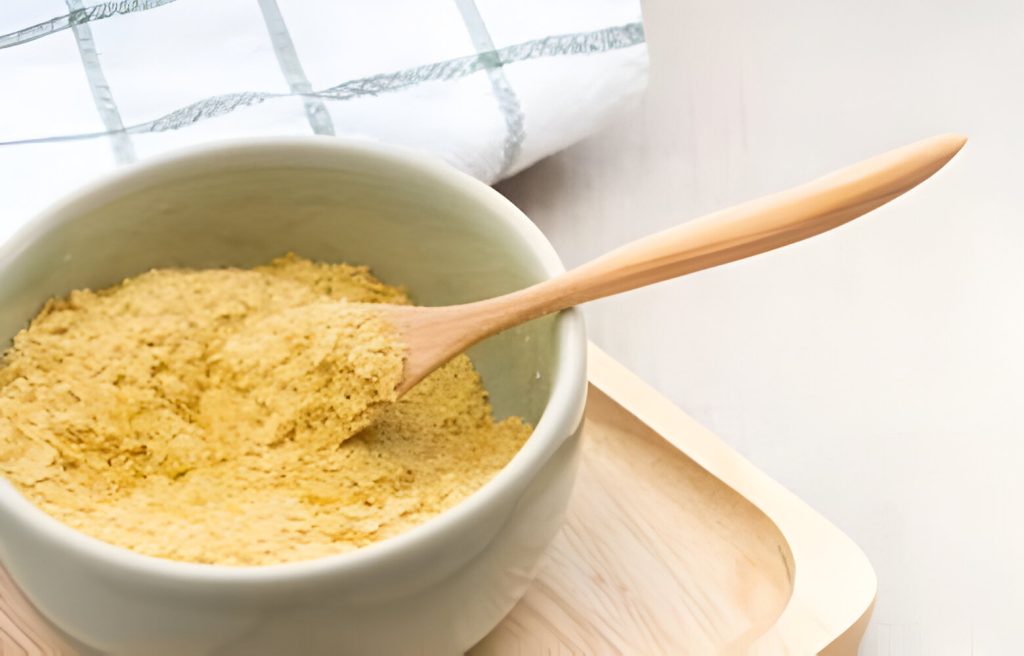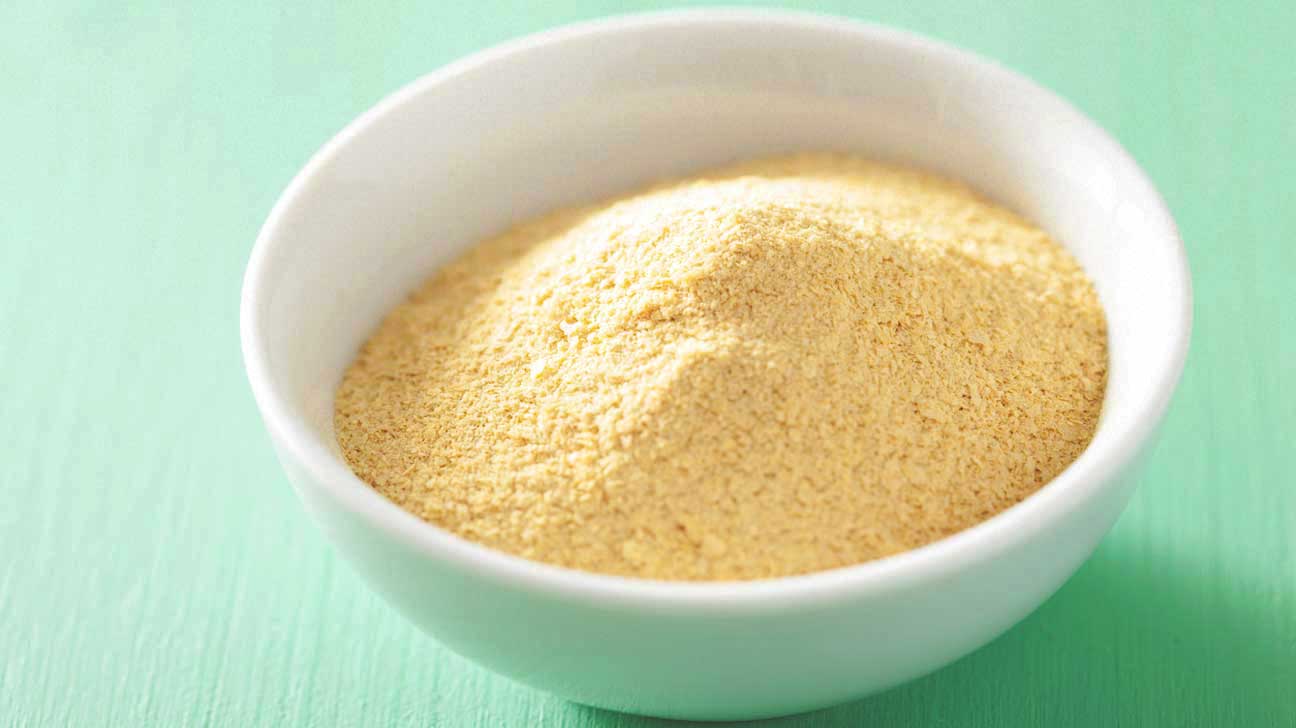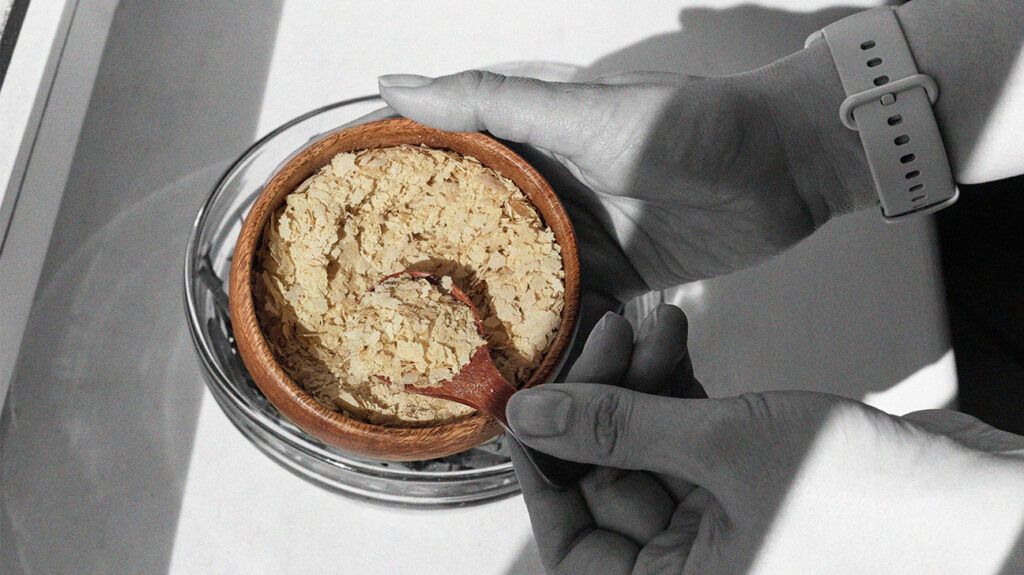Nutritional yeast is a nutrient-rich, deactivated yeast used as a food supplement in vegan and vegetarian diets. Packed with vitamins, minerals, and protein, it provides a boost of flavor and health benefits to a variety of dishes.
As a complete protein source, it contains all the essential amino acids needed by the body. Additionally, it is rich in B vitamins, particularly vitamin B12, which is often lacking in plant-based diets. With its cheesy, nutty flavor, nutritional yeast is a versatile ingredient used in recipes ranging from sauces and dips to soups and salads.
Whether you’re looking to enhance the nutritional value of your meals or add a savory touch, nutritional yeast is a valuable pantry staple.
What Is Nutritional Yeast?
Nutritional yeast is a deactivated yeast commonly used as a cheese substitute in vegan dishes. It is a rich source of vitamins, minerals, and protein, making it a popular choice among health-conscious individuals. Nutritional yeast has a nutty, cheesy flavor, making it a versatile ingredient in various recipes.

Nutritional Yeast Definition
Nutritional yeast is a highly nutritious food product that is gaining popularity among health-conscious individuals. It is a deactivated yeast, primarily obtained from the species Saccharomyces cerevisiae, which is the same yeast used in baking and fermentation processes. However, unlike active yeast, nutritional yeast is not used as a leavening agent and is instead dried and sold as a yellowish powder or flakes.
Nutritional Yeast Production
The production of nutritional yeast involves growing the Saccharomyces cerevisiae yeast in a nutrient-rich environment, often using sugar cane or beet molasses as a source of energy. The yeast cells are then harvested and undergo a process of washing, heating, and drying, which deactivates them while preserving their nutritional content.
During the drying process, the yeast is typically fortified with additional vitamins and minerals, such as thiamine, riboflavin, niacin, and folic acid, to enhance its nutritional value. This fortification makes nutritional yeast an excellent source of essential nutrients, making it a popular choice among vegans and vegetarians looking to supplement their diets.
Once the drying process is complete, the yeast is ground into a fine powder or left in flake form, allowing for various culinary uses. The flavor of nutritional yeast is often described as savory, cheesy, or nutty, which makes it a versatile ingredient in a range of dishes.
Overall, nutritional yeast is not only a delicious addition to many recipes, but it also offers numerous health benefits, including being a rich source of protein, vitamins, minerals, and dietary fiber. Whether you’re following a specific dietary plan or simply looking to incorporate more nutrient-dense ingredients into your meals, nutritional yeast is a fantastic choice.
Nutritional Yeast Nutrition
Nutritional yeast is a highly versatile and nutritious ingredient that offers a wide range of health benefits. Let’s delve into the nutritional profile of nutritional yeast to understand its significance in a healthy diet.
Key Nutrients
Nutritional yeast is packed with essential nutrients beneficial for overall health:
- Protein: Supports muscle growth and repair
- Fiber: Aids digestion and promotes gut health
- B Vitamins: Vital for energy production and cell function
- Trace Minerals: Including zinc, selenium, and iron
Health Benefits
Nutritional yeast offers various health benefits:
- Boosts Immunity: Rich in beta-glucans to strengthen the immune system
- Supports Heart Health: Contains niacin to lower cholesterol levels
- Enhances Energy Levels: High in B vitamins that combat fatigue
- Promotes Skin Health: Zinc content contributes to healthy skin
Incorporating Nutritional Yeast In Your Diet
Try these delicious ways to include nutritional yeast in your meals:
- Sprinkle on popcorn for a savory snack.
- Add to pasta dishes for a cheesy flavor.
- Mix into soups and stews for a boost of umami.
Here are some tips for incorporating nutritional yeast into your daily routine:
- To prevent stomach problems, start with a small dose and increase it gradually.
- Use it as a topping or seasoning in place of cheese in your favorite dishes.
- To keep it fresh, store it somewhere cold and dry.
Nutritional Yeast For Specific Health Conditions
When it comes to supporting our overall health and well-being, proper nutrition is key. Nutritional yeast, a popular plant-based ingredient known for its savory, cheese-like flavor, is not only delicious but also has numerous health benefits. In this article, we will explore how nutritional yeast can be beneficial for specific health conditions, such as boosting immunity and supporting digestive health.
Boosting Immunity
Our immune system plays a crucial role in defending our body against harmful pathogens and keeping us healthy. Nutritional yeast is rich in various nutrients that can help boost our immune system and strengthen its defense mechanisms.
- Loaded with B vitamins: Nutritional yeast is a great source of B vitamins such as B1, B2, B3, B6, and B12, which are essential for optimal immune function. These vitamins help support the production of immune cells and enhance their ability to fight off infections.
- Packed with antioxidants: Antioxidants are compounds that protect our cells from damage caused by free radicals. Nutritional yeast contains antioxidant-rich nutrients like selenium and zinc, which help support a healthy immune system.
- Enhances gut health: A strong immune system starts with a healthy gut. Nutritional yeast contains fiber, which acts as a prebiotic, feeding the beneficial bacteria in our gut. This, in turn, helps maintain a balanced microbiome and supports overall immune function.
Supporting Digestive Health
A well-functioning digestive system is essential for proper nutrient absorption and overall well-being. Nutritional yeast can play a beneficial role in supporting digestive health in several ways.
- Promotes a healthy gut microbiome: Nutritional yeast contains beta-glucan, a type of fiber that acts as a prebiotic. Prebiotics nourish the beneficial bacteria in our gut, helping to maintain a healthy balance and support proper digestion.
- Assists in nutrient absorption: The B vitamins found in nutritional yeast are crucial for the metabolism of carbohydrates, proteins, and fats. By supporting these metabolic processes, nutritional yeast aids in the breakdown and absorption of nutrients from the food we consume.
- Helps alleviate digestive discomfort: Nutritional yeast is a natural source of enzymes that can aid in the breakdown of complex molecules, improving overall digestion and reducing bloating or discomfort.
Overall, incorporating nutritional yeast into your diet can have a positive impact on your immune system and digestive health. By providing essential nutrients and supporting a healthy gut microbiome, nutritional yeast is a valuable addition to any well-balanced diet.
Potential Risks And Allergies
Nutritional yeast is renowned for its numerous health benefits and is widely used as a flavor enhancer, particularly in vegan and vegetarian cooking. Despite its many advantages, it also carries potential risks and allergens that should be carefully considered.
Allergic Reactions
Allergic reactions to nutritional yeast are rare, but they can still occur. Symptoms of an allergic reaction may include hives, itching, gastrointestinal upset, and in severe cases, anaphylaxis. Before adding nutritional yeast to their meals, people with allergies or sensitivities to yeast should proceed with caution and seek advice from a healthcare provider.
Possible Interactions With Medications
Some individuals may experience interactions between nutritional yeast and certain medications. Medications that may interact with nutritional yeast include immunosuppressants and medications for autoimmune conditions. It’s crucial for individuals taking these medications to seek medical advice before consuming nutritional yeast.

Credit: www.healthline.com
Buying And Storing Nutritional Yeast
Nutritional yeast is a popular ingredient known for its nutty, cheesy flavor and rich source of nutrients, making it a valuable addition to any diet. When buying and storing nutritional yeast, it’s important to consider the type you purchase and the proper storage methods to preserve its freshness and maximize its benefits. Let’s delve into the key factors to keep in mind when selecting and storing nutritional yeast.
Choosing The Right Type
When it comes to selecting nutritional yeast, ensure you opt for unfortified varieties to avoid unnecessary synthetic additives. Look for non-GMO and organic options, which offer a more natural and pure form of nutritional yeast, free from unwanted chemicals and genetically modified ingredients.
Proper Storage Methods
Ensure to store your nutritional yeast in an airtight container or a resealable bag to maintain its freshness and prevent moisture from compromising its quality. Keep it in a cool, dry place away from direct sunlight to preserve its flavor and prolong its shelf life.
Comparing Nutritional Yeast With Other Supplements
When it comes to supplements, there are many options available in the market that claims to provide various health benefits. One such supplement that has gained popularity in recent years is Nutritional Yeast. How does it stack up against other supplements, though? Let’s take a closer look at two commonly consumed supplements and see how Nutritional Yeast stacks up against them.
Nutritional Yeast Vs. B Vitamins
Nutritional Yeast is often praised for its high content of B vitamins. B vitamins are essential for maintaining our overall health and well-being. They play a crucial role in energy production, DNA synthesis, and red blood cell formation.
While Nutritional Yeast does contain B vitamins, it is important to note that it is not a complete replacement for B vitamin supplements. B vitamin supplements are specifically formulated to provide optimal amounts of each individual B vitamin, ensuring that you meet your daily requirements. On the other hand, Nutritional Yeast provides a good source of several B vitamins, but the amounts may vary between brands.
It’s worth mentioning that Nutritional Yeast is particularly rich in vitamin B12, which is commonly found in animal products. For those following a vegan or vegetarian diet, Nutritional Yeast can be a great way to supplement B12 intake. However, it is always recommended to consult with a healthcare professional to determine if additional supplementation is necessary.
Nutritional Yeast Vs. Protein Powders
Protein powders are popular among fitness enthusiasts and athletes who want to increase their protein intake for muscle building and recovery. Nutritional Yeast, though not widely recognized as a protein powder, does contain a significant amount of protein.
While protein powders are typically derived from various sources, such as whey or plant-based proteins like pea, hemp, or rice, Nutritional Yeast is a plant-based source of protein. It is rich in essential amino acids and typically provides around 2 grams of protein per tablespoon.
However, it’s important to note that protein powders are specifically formulated to provide a higher concentration of protein per serving. Depending on your protein needs, using Nutritional Yeast as a protein supplement may not provide sufficient amounts compared to protein powders.
In conclusion, Nutritional Yeast offers unique nutritional benefits, particularly in terms of B vitamins and protein content. However, it is essential to understand that it is not a complete replacement for B vitamin supplements or protein powders. Including Nutritional Yeast in your diet can be a great way to add flavor and boost nutritional value, but for optimal supplementation, it is always advisable to consult with a healthcare professional to determine your specific needs.

The Future Of Nutritional Yeast
Research And Development
Experts continue to invest in research to unravel new health benefits of nutritional yeast.
- Studying its effects on gut health.
- Exploring potential antimicrobial properties.
- Investigating its role in boosting immune function.
Potential Applications
Nutritional yeast holds promise in various applications beyond traditional use as a condiment.
- Plant-based recipes: Enhancing flavor in vegan dishes.
- Nutritional supplements: Fortifying foods with additional vitamins.
- Alternative to dairy: Creating cheesy textures in dairy-free products.

Credit: www.healthline.com
Frequently Asked Questions Of Nutritiional Yeast
Is Nutritional Yeast Actually Good For You?
Yes, nutritional yeast is good for you as it’s high in protein, B vitamins, and minerals. It can boost immune function and improve digestion. Additionally, it’s a great source of antioxidants and may help lower cholesterol levels.
What Do You Use Nutritional Yeast For?
Nutritional yeast is used as a flavor enhancer in savory dishes, and as a cheese substitute in vegan recipes. It is a source of vitamin B12 and adds a nutty, cheesy flavor to foods.
Is Nutritional Yeast A Good Probiotic?
No, nutritional yeast is not a probiotic. It does not contain live bacteria strains necessary for probiotic benefits.
What Is Nutritional Yeast Taste Like?
Nutritional yeast tastes nutty, cheesy, and savory. It adds a umami flavor to dishes.
Conclusion
Nutritional yeast is a versatile food product that offers a wide range of benefits. Its rich nutrient profile, including vitamins, minerals, and protein, makes it a valuable addition to a healthy diet. Whether you’re a vegan looking for a source of vitamin B12 or simply seeking a way to enhance the flavor of your dishes, nutritional yeast is worth including in your pantry.
So, go ahead and incorporate this delicious and nutritious ingredient into your meals for a boost of flavor and health.

I am a health writer and blogger based in the US and UK. I have been with the health department for six years. And I give advice on various health problems and solutions. I have a lot of experience in health matters and I share it here.

